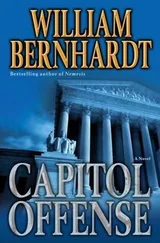“I don’t think it will make any difference.”
“Oh, well. It’s not as if she’s ever gotten herself in trouble before.” He popped open a beer. “So, why is she in Chicago while you’re here?”
Ben’s forehead creased. “I assume she’s working on her impending trial.”
“But you’re not.”
“No, I’m not.”
“And there’s nothing unusual about that.”
“No, there isn’t. We’re two separate human beings. We have separate lives. Separate identities.”
“Fine, fine. Don’t go all I-did-not-sleep-with-that-woman on me. You want the last slice of pizza?”
Ben cast his eyes down to the nearly empty cardboard box. “Not enough to arm wrestle you for it.”
“Good call. I’d cream you.”
“I’ve been working out.”
Mike dangled the tail of the last Combo Supreme over his lips. “Success is counted sweetest / By those who ne’er succeed…”
Maybe he should call her, Ben thought, as he sat in his overstuffed chair staring at nothing. Forget that he had turned the case down, that she had gone over his head. She had been practicing for almost two years now; it was not unusual for her to handle a case on her own. Joni had said he was a mentor. Maybe he should take that attitude. Offer her that kind of assistance, just like when he was starting out and he’d had-
Well, okay, he pretty much did it on his own. But that didn’t mean Christina had to. He should just pick up the phone and-
But he couldn’t. Not this time. Not this case. It went too deep. The hurt was too ingrained. He couldn’t make himself do it. And even if he did, how could he know he was doing a good job? He couldn’t possibly be objective, not here, not with-
He stretched his feet out on the ottoman. His stomach was churning, and it wasn’t because of the pizza, either. This was tearing him apart. He played the piano for a while, but it didn’t calm him. He tried to work the New York Times crossword, but couldn’t focus. All he could think about was Christina.
He had known her for so long now, cared about her so deeply, he felt closer to her than anyone he had ever known in his life. Not that he would ever tell her that. But it was true. He hated leaving her dangling in the wind like this. What was that kid’s mother doing, anyway, giving a case of this magnitude, with this much media saturation, to a lawyer of Christina’s relative inexperience?
Of course he knew exactly what she was doing. And that was why he couldn’t give in.
He gripped the arms of his chair resolutely. This was the way it had to be, like it or not. He could not help Christina with this case. Not at all. Not a bit. Absolutely not. Never.
The next morning, Ben unlocked the front doors and tiptoed into his office. As far as he knew, everyone else was in Chicago, but he was taking no chances.
With great stealth he made his way to Christina’s office. Her desk was a mess, as usual, but this time she had a pretty good excuse. He was glad, because it made it all the easier for him to execute his plan.
He punched on the computer monitor at Jones’s workstation. He knew Christina had a laptop and would check for e-mail periodically. First, he forwarded a hyperlink to a Web page on the University of Chicago Law School’s Web site: STUDENTS SEEKING INTERN POSITIONS. Next, he sent a link to the Lexus database that keyed up the text of State v. Harmon . Christina was brilliant when it came to arguments in equity, which were the heart of any motion for a continuance, but she sometimes forgot about the more arcane legal precedents; what’s more, Ben’s sources had told him that Judge Lacayo was a sucker for public policy arguments. Since he was using Jones’s e-mail program, Christina would assume the case had come from Paula. Which was good.
After all, it was important that everyone understand that he would not help Christina with this case. Not in the least.
JOURNAL OF TONY BAROVICK
The day of my high school graduation I decided I was coming out. This was no small decision. I lived in the suburbs, after all, deeply traditional, conservative suburbs, dominated by huge churches, Democrats who always voted Republican, and trailer trash who measured success by the size of the wheels on your pickup. To say that gay men had to remain in the closet is to state the obvious. Oh, there were probably worse places-we did at least have some gay bars and a small gay underground network-but it wasn’t exactly Greenwich Village, if you catch my drift.
And my father. Since I’m treating this journal more like a third-rate autobiography than a diary, I should make the point up front that my father was not a bad person. More than once he surprised me with his kindness, with his startling gentility. But he had not exactly been raised with a progressive attitude, and it showed. At heart, he was still the kid from the projects raised by poor white laborers, and as a result, he carried around the baggage of every kind of prejudice there was: prejudice against foreigners, minorities, Catholics, aggressive women and, predictably enough, homosexuals. I remember once in the seventh grade when I got the lead in the middle school musical. My mother was delighted, but I noticed that Dad’s reaction was much more subdued. Late that night, when Mother wasn’t around, he made a rare effort to talk to me. “I guess being in plays is all right,” he said in that awkward sputtering drawl of his. “Problem is you gotta watch out for the fags.” He said it as if it were a two-syllable word.
I didn’t know what he was talking about, or pretended I didn’t, but he reinforced my later determination to keep my secret to myself. He was right, of course; there were plenty of guys who shared my sexual inclination treading the boards, but that didn’t make it any easier. In the early Eighties, when the AIDS plague started making the papers, I remember my father throwing down the Sun-Times in disgust and saying, “Who the hell cares about a bunch of queers?” Quite a statement, coming from a man who I knew had a good heart, who really had no meanness in him. Imagine what you’d get if you combined all those inbred prejudices with someone who did have some meanness in him. Maybe a lot of meanness.
That and countless similar remarks told me exactly where my dad stood on this issue that was of crushing importance to me. Which explains why I put off telling him for as long as I did. Mother was a different matter-she wasn’t going to like it, just as she didn’t like it when I wouldn’t try out for the tennis team. But bottom line-she loved me, and she always would, and if it turned out I was gay, she’d learn to live with it. Father was different. I couldn’t predict how he’d take it.
Not well, as it turned out. I don’t believe for a minute it came as any great surprise. He wasn’t a stupid person. I’m sure he’d seen the signs. About the only time in his life he gave me money without my asking for it was before that senior prom. I found an envelope on my bed with a hundred-dollar bill in it and a note that read: TAKE A GIRL OUT FOR THE TIME OF HER LIFE. He knew, or at least suspected. But I guess that isn’t the same as being told.
The weird thing was he seemed to take it as a reflection on himself, not me. “Too much time with his mother,” he muttered, turning his eyes skyward. “Never had to work for anything. Not like I did.” I didn’t know what that had to do with anything, but it seemed to make sense to him. Mother was okay till he spewed out, “You had to push him into all those plays, didn’t you? Singing lessons? My God, it’s no wonder.” Mother broke down at that point-and I left. I already had an apartment lined up for the summer, and a job. I didn’t need this crap. Not from the people who brought me into the world.
Читать дальше









